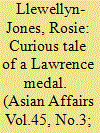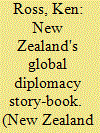| Srl | Item |
| 1 |
ID:
136143


|
|
|
|
|
| Summary/Abstract |
The praxis of an Indigenous Fijian researcher who is both an insider/outsider offers some valuable lessons for ethnographic work. This paper introduces ‘cultural discernment’ as a concept used to ensure that the research process is culturally ethical within the research setting. An insider will always require a sense of cultural discernment, recognising that actions taken have implications that are critical and remain with the researcher for life. The paper contextualises the concept of cultural discernment in relation to Fijian epistemology. Although there are risks within any research project with regard to ethics processes and the conduct of research, this paper will illustrate how Western paradigms associated with ‘expert knowledge’ and the ‘lay knowledges’ of an Indigenous population group produce competing understandings about ethical practice. The paper draws on a doctoral research project exploring the cultural conceptualisation of health and well-being, conducted in Fiji and New Zealand. The research process and steps carried out in this study ensured those actions were culturally appropriate and ethically sound from an Indigenous Fijian perspective.
|
|
|
|
|
|
|
|
|
|
|
|
|
|
|
|
| 2 |
ID:
135350


|
|
|
|
|
| Summary/Abstract |
The Lawrence medal in question was purchased some thirty years ago in New Zealand and the obverse side had clearly been filed down. Relatively few Lawrence medals were ever struck, but extensive research has not yet revealed the identity of the original recipient of a medal now safely back with the Society
|
|
|
|
|
|
|
|
|
|
|
|
|
|
|
|
| 3 |
ID:
134925


|
|
|
|
|
| Summary/Abstract |
Our prime ministers have been the most important players projecting New Zealand globally. Of the fifteen prime ministers since 1945, Norman Kirk stands out the most. His inspired branding of New Zealand as a progressive small state, with a deep internationalism central to our national identity, was a pinnacle moment for our global diplomacy. He found for us the global role best suited to our strengths - being a good international citizen. The Kirk branding endures, largely because of his outstanding effort. David Lange, Jim Bolger and Helen Clark have backed his branding with strong support performances. Sir Robert Muldoon and John Key have been the only prime ministers who have not committed wholeheartedly to the Kirk brand.
|
|
|
|
|
|
|
|
|
|
|
|
|
|
|
|
| 4 |
ID:
134657


|
|
|
|
|
| Summary/Abstract |
Australia's interest in nuclear weapons in the 1950s and 60s is usually explained in terms of high politics and grand strategy. This proliferation case study explores, in greater detail than hitherto, the important part played by the Royal Australian Air Force (RAAF) in pressing for a nuclear capability. It seeks to understand the reasons behind the RAAF's lobbying, in particular its previous experience with air power, its visceral desire for advanced manned bomber aircraft, and its strong institutional link to the British Royal Air Force. The decision in 1963 to acquire the supersonic US F-111 strike aircraft, instead of rivals including the British TSR.2, is also considered. Once the RAAF's bomber ambitions were satisfied, interest in nuclear weapons was greatly reduced. Finally, some comments are included on the nuclear interests of other air forces in the British Commonwealth.
|
|
|
|
|
|
|
|
|
|
|
|
|
|
|
|
| 5 |
ID:
134932


|
|
|
|
|
| Summary/Abstract |
More than 50 years ago Frank Corner suggested that a 're-discovery of our role in the South Pacific will contribute to the process by which we are regaining our national confidence and re-discovering our unique identity as New Zealanders'. This raises more questions than could possibly be tackled in a review article or indeed by someone whose direct South Pacific experience coincides with the time of Corner's proposition. But how much do New Zealanders know about the countries of the South Pacific outside their availability as tourist destinations and as the home of Pasifika New Zealanders? The tragic 2009 tsunami more than any other recent event brought Samoa to the attention of New Zealanders.
|
|
|
|
|
|
|
|
|
|
|
|
|
|
|
|